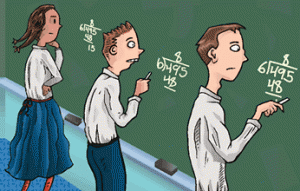Science talks about genetic lottery… haves and have nots, lucky and unlucky.
The truth is both simpler and more complicated.
Human DNA has capacities encoded, but they are either turned on or not. And even capacities that are turned of, may be used, or not used.
The kids in studies who are good at reading but not good at math are dealing not with a reading gene and a math gene missing, instead they deal with something less simplistic than that.
There is no reading gene and there is no math gene. On the other hand, there are 160 genes that lie underneath all the clever feats a child or adult can perform to scientists’ amazement. Sarcasm intended.
So, let’s take an example: you got a kid who is good at reading… but isn’t good at math. I say, that the capacity that is definitely missing is humility: the capacity to say: I am incompetent, I don’t know anything: teach me.
Why? Isn’t saying “I am incompetent” going to keep me stunted? No, the opposite is true. What keeps you stunted is what you have decided is true about you and about the world.
When your earlier decision was: I am not good at math… you’ll not even try. You already know that you won’t be able to get it.
Are there other capacities that are missing? Probably another up to eight capacities… duh…
And another thing that has been bugging me: race
I have students from many races. Black students, from the USA already know that they are “defective” genetically, and don’t even try.
Black students from Africa: shine.
 The most important block to growing as a human are the societally decided characteristics, the genetic lottery, you are this way or that.
The most important block to growing as a human are the societally decided characteristics, the genetic lottery, you are this way or that.
I say that every single DNA capacity can be turned on in every person… that every human person has all 160, activatable, and talented people, smart people just use more of what they have.
Now, why is it that certain societies’ members have less capacities already turned on?
It is because social evolution is lagging in those communities… In Africa, in Australia, in America, the natives weren’t even engaging in agriculture, when they were found, a few hundred years ago, they were more than a thousand years behind in social evolution. Hunters and gatherers…
But their DNA is the same, they are humans, and can become all another ethnic group can become… just not with evolutionary means… by that I mean through suffering, needing the capacities, etc.
It’s life… and being bummed out about is is useless. With the large scale activation I am doing through ancestry, many of those left behind groups will leapfrog ahead… I think, evening out the playing field.
OK, and here is the article about where science is about this:
About half of kids’ learning ability is in their DNA, study says
Students who excel at math also excel at reading thanks to “generalist genes,” scientists say. (Carlos Chavez / Los Angeles Times)
by Julia RosenYou may think you’re better at reading than you are at math (or vice versa), but new research suggests you’re probably equally good (or bad) at both. The reason: The genes that determine a person’s ability to tackle one subject influence their aptitude at the other, accounting for about half of a person’s overall ability.
The study, published Tuesday in the journal Nature Communications, used nearly 1,500 pairs of 12-year-old twins to tease apart the effects of genetic inheritance and environmental variables on math and reading ability. Twin studies provide a clever way of assessing the balance of nature versus nurture.
“Twins are like a natural experiment,” said Robert Plomin, a psychologist at Kings College London who worked on the study. Identical twins share 100% of their DNA and fraternal twins share 50% (on average), but all siblings presumably experience similar degrees of parental attentiveness, economic opportunity and so on. Different pairs of twins, in contrast, grow up in unique environments.
The researchers administered a set of math and verbal tests to the children and then compared the performance of different sets of twins. They found that the twins’ scores — no matter if they were high or low — were twice as similar among pairs of identical twins as among pairs of fraternal twins. The results indicated that approximately half of the children’s math and reading ability stemmed from their genetic makeup.
A complementary analysis of unrelated kids corroborated this conclusion — strangers with equivalent academic abilities shared genetic similarities.
What’s more, the genes responsible for math and reading ability appear to be numerous and interconnected, not specifically targeted toward one set of skills. These so-called “generalist genes” act in concert to determine a child’s aptitude across multiple disciplines.
Just as we no longer blame mothers for schizophrenia, we should be humble when blaming schools and parents for not every child learning as quickly as we’d desire. – Timothy Bates, professor of psychology at the University of Edinburgh“If you found genes for reading,” Plomin said, “you have over a 50% chance that those same genes would influence math.”
That’s not to say specialized brain circuits don’t exist for different tasks, said Timothy Bates, a psychologist at the University of Edinburgh who was not involved in the study.
“If those ‘squiggles on a page’ the young child encounters are math or prose, different brain systems, with different genes, are involved in learning to decode them,” he said. The new study just illustrates that these genes build on a more general foundation of learning ability, he said.
Tibetans get high-altitude edge from extinct Denisovans’ genes
Tibetans get high-altitude edge from extinct Denisovans’ genesThe finding that one’s propensities for math and reading go hand in hand may come as a surprise to many, but it shouldn’t. People often feel that they possess skills in only one area simply because they perform slightly worse in the other, Plomin said. But it’s all relative.
“You might think you’re a little less good at math, but compared to everybody in the world, you’re pretty good at math,” he said.
That’s great news for those who came out on top of the genetic lottery, but what about everyone else?
“We don’t want to pit nature vs. nurture,” Plomin said. “But for parents who still think kids are a blob of clay that you mold to be what you want them to be, I hope this data — and there’s tons of other data like this — will convince people to recognize and respect individual differences that are genetically driven.”
He sees parallels to obesity: People can no more control a genetic predisposition that causes them to struggle with arithmetic than they can control an inherited tendency to put on pounds. That doesn’t mean nothing can be done to bring those students up to par — it just might take more effort.
Plomin suggests individually tailored educational approaches could help, in which students could learn at different rates using different techniques, potentially assisted by the growing role of technology in the classroom. Finland consistently dominates international education rankings, and Plomin points to its strategy as a good example.
The Fins have decided to do “whatever it takes” to bring every child up to a minimum level of literacy and numeracy needed to survive in the modern world. In practice, this has meant reducing class sizes, trying alternative learning approaches, and spending hours outside of class with any student who needs it.
Plomin also points out that genes don’t predetermine performance. Appetite is just as important as aptitude, he said.
“The brilliant mathematician — that’s all they do for decades, they just think math and work on math,” Plomin said. “It’s not like it comes to them with a flash of inspiration. It’s really a long, long process of thinking about these things.”
The study results show that attitudes about learning are out of date and need to change, Bates said.
“Just as we no longer blame mothers for schizophrenia, we should be humble when blaming schools and parents for not every child learning as quickly as we’d desire,” he said. “The implications, I think, are that children really do differ at very deep levels in how easily they learn.”
Summary: You can wait for capacities to be activated through one of my participants, or you can have capacities activated through the free webinars, and individually.
It’s is really up to you.
But, I think, if you love your child, you’ll try to give him a better starting point than you have given…
PS: I seems that the IQ I have been measuring is a composite number to show what you can do with your current level of activated and used capacities… compared to others.



